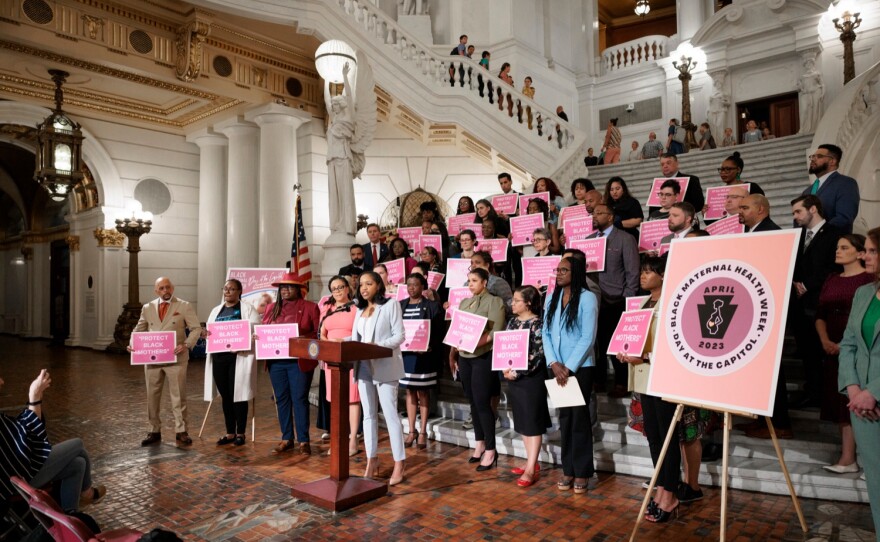BETHLEHEM, Pa. — President Biden is recognizing the health disparities among black mothers.
And a group of Pennsylvania health care professionals gathered at a news conference recently to support the effort and call attention to causes of the problems.
- Black women are three to four times more likely to die in childbirth, experts say
- A group of healthcare professionals and Pennsylvania legislators came together to discuss the issue during Black Maternal Health week.
- Advocates say systemic racism is the No. 1 cause
Biden proclaimed April 11-17 as Black Maternal Health week and laid out a plan to address the issue and improve the statistics.
"This is abnormal to see so many black and brown women die during childbirth and postpartum and so we're speaking out,” said Dr. Sharee Livingston, chairwoman of Obstetrics and Gynecology Department Chair at UPMC Lititz Hospital.
She's also cofounder of the Diversifying Doulas Initiative, which works to combat the maternal mortality crises by providing Black and Hispanic expectant people with doula support.
Voicing concerns
Livingston was among doctors, nurses, doulas, administrators, politicians and legislators at a Black Maternal Health Week news conference April 13 in the state capitol to voice concerns about the problem.
It was organized by the Pennsylvania Legislative Black Caucus, Women’s Health Caucus and Commission for Women.
“Anybody who's paying attention will hear these sorts of nauseating statistics that black women are three to four times more likely to die in childbirth, Livingston said.
“Here in the United States, our maternal mortality rate has actually increased over the past 40 years."Dr. Sharee Livingston, OB GYN Department Chair, UPMC Lititz Hospital
“Here in the United States, our maternal mortality rate has actually increased over the past 40 years, where other countries have actually seen a decline over the past 40 years."
She is among a group of women sounding the alarm about the health disparities facing women of color in Pennsylvania.
"This is abnormal, to see so many black and brown women die during childbirth and postpartum and so we're speaking out," she said.
'Often stigmatized'
Also at the news conference was Gerria Coffee, president of the Pennsylvania Doula Commission.
“We need to listen to our black patients who are often stigmatized,” Coffee said.
“When a black woman or birthing person comes into the room, the treatment that they receive, more often than not, automatically assumes that they are less than valuable in that space and it's obviously not an opinion because the statistics support that fact.”
Coffee is a Certified Postpartum Doula who has practiced her profession for nearly a decade. She said the Pennsylvania Doula Commissionaims to protect and promote the doula profession.
“A doula is a trained professional that provides continuous emotional support, informational support resources, the physical support that's provided in the labor and delivery, and that time leading up to labor and delivery is really priceless,” she said.
Her group is working to create a credential that lets doulas be recognized as a provider to be able to qualify for Medicaid reimbursement.
She said those who are not considered a CPD are often not covered by insurance, so she is encouraging others to get the certification.
Systemic racism is blamed
Coffee said she believes that if a doula were covered by Medicaid, then more black and brown would have the help and guidance they need to keep themselves and their child safe and healthy.
"The number one cause for this disparate number is systemic racism. There is no other explanation.”<br/>Gerria Coffee, president of the Pennsylvania Doula Commission
“It's very holistic in that this person is providing continuous care, not just on an appointment basis, but through calls text messages, home visits,” she said.
“They're always available to help them make educated decisions, to help them to calm their fears, to help them with nutrition and even acting as, sometimes, depending on our experience, acting as a translator if you will.
"Sometimes a birthing person may not fully understand medical terminology or some of the decisions that they're being presented with for their body and for that of their child."
Livingston detailed some of the reasons women of color die at a greater rate.
"The number one cause for this disparate number is systemic racism," she said. "There is no other explanation.”
She said other factors include chronic illness and disease, opioids and better information tracking across health care systems.
Livingston and Coffee said the best way to begin to fix the problem and close the gap is by talking about the issue, as they did in Harrisburg.
The two marked Black Maternal Health Day in Harrisburg on April 13.



